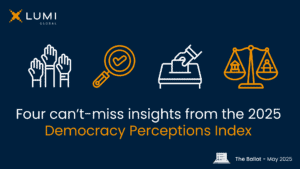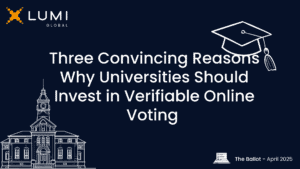Citizens of “democratic” countries tend to think that living in such a place automatically makes them “democratic citizens” – after all, they are free to vote, run for office, protest, or participate in local democratic events. But can citizens of democracies who are largely inactive in democratic organizations and processes still be “democratic citizens?” Additionally, how might we create such “democratic citizens” in places where they are lacking? In this article, we do our best to answer these questions.
The “Cultural Democrat”
Our discussion of democratic citizenship begins with what we term “cultural democrats,” something which is becoming a problem in consolidated democracies. To understand what we mean by the term, think about someone who celebrates Christmas but neither attends church services nor believes in the tenets of Christianity, as many people in Denmark do. They may consider themselves Christians due it being the religion of the state and having grown up with its ceremonies and holidays, but are more appropriately termed “cultural Christians” since they do not regularly (if at all) practice the religion. It is from this phenomenon that we take the term “cultural” and apply it to citizens of democracies who identify with democracy yet do not practice it, i.e. “cultural democrats.”
A “cultural democrat” is therefore someone who may believe in and benefit from democratic institutions and norms but does not practice democracy regularly or in a meaningful way. It is essentially the halfway point between someone intimately involved in democratic processes and bodies (our focus for this piece) and what Aristotle deemed “mechanics.” “Mechanics” were residents of a democratic polity who were needed to maintain the system but were not officially citizens and could not participate in democracy themselves, such as women and slaves in ancient Athens. Unlike the “mechanics,” however, “cultural democrats” are citizens who are able to run for office, participate in democratic organizations, vote, and protest yet often do not do so unless it is convenient for them.
So why exactly are “cultural democrats” a problem? As we’ll touch upon later, maintaining a “cultural democracy” in contrast to a “culture of democracy” is problematic because democracy has two parts: beliefs and practices. Without the latter, the former becomes meaningless and it becomes difficult to instill a grassroots appreciation for democracy from a young age.
Democratic Citizenship
Having covered the issue of “cultural democrats,” we now turn to the namesake of this piece: the “democratic citizen.” While there is no single definition of a “democratic citizen,” we will use this section to present evidence-based characteristics a “democratic citizen” does (or should) possess in order for democracy to reach its full potential.
Democratic citizens:
- Are best raised as such from a young age
In his 1916 work Democracy and Education, American philosopher John Dewey argued that “a democracy is more than a form of government; it is primarily a mode of associated living, of conjoint communicated experience.” What he meant by this is that democracy is not something narrowly defined by a set of practices and institutions; it is rather a method of collective problem-solving in which individuals work together towards the betterment of their realities through cooperation, trust, and understanding. It is therefore something that people of all ages can and should experience throughout their lives.
In spite of this, a problem pointed out by researchers is that children are often treated as “citizens-in-the-making” who only obtain democratic citizenship upon reaching the age of suffrage. Arguably this line of thinking stems from the fact that, as pointed out by Benedict Anderson, education in nation-states early on was very civics and institution-focused as a means to create a united citizenry out of what used to be scattered groups. But now, this type of education in which youth are treated as pre-democratic beings in need of extensive education before they can be “democratic” may in fact be limiting the ability of youth to appreciate democracy. Even though youth can and do participate in democratic activities at school and in youth organizations, European policy focuses too much “directing…[youth] to their future democracy” instead of encouraging and enabling democratic activities youth can engage in now.
Of course, sometimes actions (or numbers) speak louder than words. In a 2022 study spanning nine European countries, researchers looked into precisely how youth involvement in democratic activities affected their appreciation of and participation in democratic institutions later on. The results speak for themselves: participation in democratic activities such as the student council, protesting, attending meetings, and organizing political events was strongly associated with an increase in political participation later in life in all nine countries and political trust in eight countries. Put shortly, youth can become “democratic citizens” and will carry their citizenship into adulthood when they are able to enjoy democratic activities during their formative years.
- Learn by doing
What should be clear at this point is that, as put by an article from Tufts University in the US, “we don’t automatically become engaged, informed, and empowered to participate in..democracy when we turn 18.” While civic education has an important role to play, the fact of the matter is that “democratic citizenship” cannot be understood “as the outcome of an educational trajectory.” To reiterate a previous point, beliefs in democracy serve little purpose unless they are accompanied by actions in which we put said beliefs into practice. Even more critically, as noted by the previously-cited paper about youth participation, “the hard test for democratic citizenship” is not voting, it is “additional political participation” where citizens themselves engage in conflict recognition, mediation, and resolution.
As a whole, democracy is a way of life; “rule by the people” is something which is comprehensible to the youngest of us but consequential for all of us since it not only affects our lives but allows us to exert influence over how it affects our lives. In his essay “What Is Democracy,” Danish philosopher Hal Koch argues that democracy is a “way of living which applies to all relationships humans have with one another” and that the “political wisdom of democracy is that everyone must take part in running” democratic institutions. To return to the previous section, meaningful democratic “participation” for youth “is characterized by shared roles, responsibilities, and an emphasis on doing rather than voice.” The same goes for adults: actions speak louder than words when it comes to being a “democratic citizen” and it is ultimately actions which substantially deepen our understanding and appreciation of democracy.
- Trust one another
To quote John Dewey once more, “Democracy is a way of life controlled by a working faith in the possibilities of human nature.” The bottom line is, if the people – the basis of democracy or “rule by the people” – can’t trust one another, then it is not possible to have a democracy in the truest sense of the word. “Trust” to a democratic citizen is not necessarily about trust in elected officials or governing bodies – which often is not correlated with youth democratic participation – but rather about interpersonal trust which is formed via forming relationships with others. As we touch upon in a previous blog post, this sort of trust a “democratic citizen” needs is only obtained through building social capital and participating in local democracy.
The important point to make here is that “trust” in the democratic sense does not mean that “democratic citizens” see eye-to-eye on all issues. Quite the opposite: a healthy democracy is always open to differing opinions from citizens since they have different backgrounds or experiences which can lead to differing perspectives. As Hal Koch put it, democracy is about reaching, through meetings and dialog, “a better and more appropriate understanding [of an issue]” leading to a decision which doesn’t benefit a “single person or a class,” but takes into account “the whole” of the democratic citizenry. What therefore sets “democratic citizens” apart is that, even though they may disagree with one another sometimes, they understand their fellow citizens are all equal parts of a community working for the betterment of the whole.
- Are active with a purpose
Turning back to the first section, the key difference between a “cultural democrat” and a “democratic citizen” is one key word: participation. Though we cannot deny the benefits of living in a liberal democracy, we currently live in a world where it is easier than ever to do the bare minimum and still consider ourselves active democratic citizens (think slacktivism) while our conception of citizenship has become very passive, one focused on what we have (rights) versus what we do with them.
It is easy by this point to understand what “active” means in a democracy, but what does “with a purpose” mean? As pointed out by one research paper, “more participation” in democratic activities in and of itself is not inherently good without clear goals in mind: Why should we do it this way? What do we seek to accomplish? Barry Percy-Smith, a professor of childhood, youth, and participatory practice in the UK, puts it frankly: “participation is not about having a say, but about a democratic process of people working together to increasingly influence and make decisions.” Ergo, a “democratic citizen” is someone who doesn’t participate merely out of a sense of civic duty or service but instead because they understand why solving problems via democratic means is worthwhile and how they can exert influence over democratic activities.
Tuning Up the “Mechanics”
Circling back to where we started, we fortunately live in a time where no adult citizen can be considered a “mechanic,” someone who lives in a democracy but cannot be a “democratic citizen.” However, we now find ourselves in the midst of an identity crisis: can a person be a “democratic citizen” if they hold dear the ideals of democracy but do not themselves take that extra step to actually be involved in democratic institutions and practices? The easy answer is no, as such citizens would actually just be “cultural democrats.” And, unfortunately, it is much more difficult for “cultural democrats” to pass down a commitment to democracy to youth since their own commitment to democracy is not as deep as it seems.
But what we have to remember is that, even if we ourselves were not brought up from a young age to be “democratic citizens,” it is never too late to step up to the plate for both ourselves and future generations so that we all may enjoy democracy for years to come. From joining a local political party or democratically-run interest organization to running for office or serving in a leadership post, there is no shortage of opportunities for us to experience all of what democracy has to offer us beyond just voting and posting online. Democracy’s survival necessitates that we seize these opportunities in pursuit of becoming “democratic citizens.”


